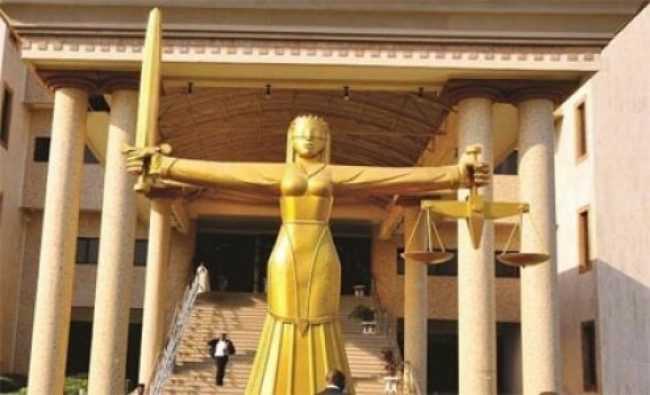

Justice Rilwan Aikawa of the Federal High Court, Lagos on Wednesday sentenced an oil thief, Abednego Ogede to 10 years imprisonment for unlawful dealing in petroleum product.
Justice Aikawa had earlier on December 18, 2019 convicted Ogede in absentia.
The judge found the convict guilty alongside a vessel, MV Shirley and a company, Sagwe International Limited of the four-counts charge of conspiracy and illegal and unlawful dealing in 145, 000 metric tonnes of Automated Gasoline Oil (AGO) brought against them by the Economic and Financial Crimes Commission (EFCC).
After declaring the convict guilty of the charges, the prosecutor, Rotimi Oyedepo, had urged the court to forfeit the vessel and the company charged with the convict to the federal government.
Oyedepo also pleaded with the court to empower all security agencies in the country to arrest the convict and bring him to court for the purposes of sentencing him.
The court granted the order and ordered that the convicted oil thief be arrested and produce at the next sitting of the court.
Read Also: Police Arrest 3-Man Robbery Gang In Delta, Recover Four Guns, Fake Currencies
At the resumed of proceedings on Wednesday, Oyedepo informed the court of the convict’s arrest and urged the court to sentence him as prescribed by Section 1(17) of the Miscellaneous Act, 2017.
The lawyer said, “He has been arrested after he was smoked out of his hidden by the police.
“We urge the court to sentence him according to section 1(17) of the Miscellaneous Act,” Oyedepo stated.
Responding to the prosecutor’s application, the convict’s counsel, A. Joseph, pleaded with the court to consider Section 312 of the Administration of Criminal Justice Act (2015), in sentencing his client.
He also urged that the court not to take the disappearance of the convict into consideration on the day of judgment, which he argued was as a result of fear.
Joseph submitted, “In line with Section 321 of ACJA, I urged the court to temper justice with mercy. He erred by running away and that is a product of fear.
“I urge the court not to look at his disappearance but to consider that he’s a father with children, who depends on him for survival.
“If it is possible to convert the prison term to fine, we’ll be grateful,” he stated.
Responding further, the prosecutor, Oyedepo, told the court that Section 1(17) of the Miscellaneous Act pronounced life imprisonment as punishment on anyone that unlawfully dealt in petroleum products.
He told the court that the law under which the convict was convicted did not empower the court to impose fine in lieu of the imprisonment.
He therefore urged the court to impose a prison term on the convict, this he said will convey strong messages and warning to those that still engage in such act.
Justice Aikawa after listened to lawyers held, “I’ve listened to the plea of the convict’s counsel and also to the submission of the prosecutor.
“It is a serious offence for someone dealing in petroleum products unlawfully.
“Consequently, the convict is hereby sentenced to 10 years imprisonment in count one, two, three and four.
The jail terms shall run concurrently and effective from today.” the judge ruled.
EFCC had arraigned the vessel, MV Shirley, the Company, Sagwe International Limited and the convict, Abednego Ogede, before the court sometimes in 2017, on a four count charge of conspiracy and unlawful and illegal dealing in 450, 000 metric tonnes of petroleum product.
The EFCC through its prosecutor, Rotimi Oyedepo, had told the court that the trio had committed the offences on April 19, 2017, in Lagos.
Oyedepo had told the court that the offences committed by the convict contravened Sections 19(6) of the Miscellaneous Offences Act, Cap M17, Laws of the Federation of Nigeria 2004 and punishable under Section 17 of the same Act.
He had also told the court that the offences contravened Section 4 of the Petroleum Act, Cap P10, Laws of the Federation of Nigeria 2004.
The defendants had pleaded not guilty to the charges, and they were granted bail in the sum of N10 million with two sureties in like sum.
During the pendency of the charge, the prosecution had called two witnesses, an operative of the agency and an official of Department of Petroleum Resources (DPR).
The witnesses gave their evidence on how the convict was arrested, as well tendered documentary evidence, which were admitted by the court.
The convict was the only one that gave evidence in defence of the charges levelled against him, the company and the vessel.






















